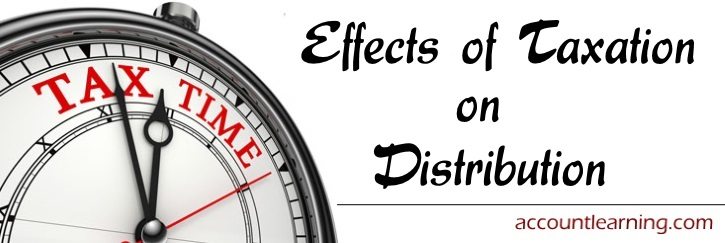Effects of taxation on distribution
Table of Contents
Effects of Taxation on Distribution
An important objective of taxation in most of the welfare states is to reduce the inequalities of income and wealth and to bring about an equal society. The effects of taxation on the distribution of income and wealth among the different sections of the society, depends upon two important factors. They are as below:
- Nature of Taxation, and
- Kinds of Taxes.

How to Nature of Taxation influence Distribution?
The nature of taxation influences the distribution of tax among the different sections of the society. It includes proportional regressive and progressive nature of taxation.
a. Effects of Regressive Taxation on Distribution
Under regressive taxation, the burden of taxation falls more heavily upon the poor than on the rich. Regressive taxation may increase the inequalities on the distribution of income and wealth. Hence, the burden of taxation is higher on the poor than on the rich. In effect, this system widens the gap between the rich and the poor.
b. Effects of Proportional Taxation on Distribution
Under the proportional taxation, taxes are levied uniformly upon the rich and the poor. When the tax rate remains the same, it creates inequalities between them. However, if there is any increase in the income of these sections, the inequalities in distribution of income will also increase. The burden of taxation falls more heavily upon the poor than on the rich.
c. Effects of Progressive Taxation on Distribution
Under the system of progressive taxation, the tax rates go up with the increase in the income. Thus, in this system, the inequalities in the income and wealth will be reduced.
The major portion of the income and the wealth of the rich is taken away by way of higher tax rates. Hence, the progressive tax system tends to reduce the inequalities in the distribution of income and wealth.
How to Kinds of Taxes influence distribution?
The effects of taxation depend upon the kinds of taxes i.e. direct or indirect taxes.
a. Effects of Direct Taxes on Distribution
Direct taxes take the form of taxation on the income and property. It attempts to reduce the income of the richer sections and transfers the income to the Government. The Government may use these resources to raise the standard of living of the poor. Therefore, all those taxes, which fall heavily upon the higher income groups, can have favorable distributional effects.
b. Effects of Indirect Taxes on Distribution
Indirect taxes are levied on commodities. They fall heavily on the lower and middle-income groups who spend a large portion of their income on commodities. In such a situation, indirect taxes have adverse distributional effects.
However, indirect taxes may be made progressive if the necessaries are exempted from taxation or levied on low tax rates, and luxuries are subjected to higher rates of taxes.


